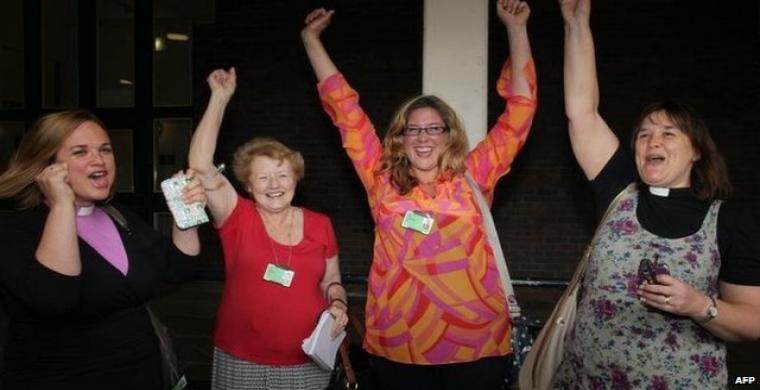YORK: Day 4 - Report on Women Bishops Debate
By Chris Sugden
Special to Virtueonline
www.virtueonline.org
July 14, 2014
Two closing speeches in the Women Bishops’ debate called members of synod to begin an adventure in which everyone would need to change, and gave the strongest possible assurances that those who could not accept women bishops and their churches would be enabled to flourish as affirmed members of the Church of England and that any departure from this would be subject to an independent monitoring group.
An early speaker was Dr. Philip Giddings the chairman of the house of laity who had voted against the legislation in 2012. He argued that the current package was now good enough. Other early speakers said that despite the great disappointment expressed after the failure of the legislation presented in November 2012, it was now clear that that decision had been correct. The 2014 “package” contains five principles of which two state:
4. Since those within the Church of England who, on grounds of theological conviction, are unable to receive the ministry of women bishops or priests continue to be within the spectrum of teaching and tradition of the Anglican Communion, the Church of England remains committed to enabling them to flourish within its life and structures; and
5. Pastoral and sacramental provision for the minority within the Church of England will be made without specifying a limit of time and in a way that maintains the highest possible degree of communion and contributes to mutual flourishing across the whole Church of England.
In his closing speech the Archbishop of Canterbury called synod members to commit themselves to an adventure: http://www.archbishopofcanterbury.org/articles.php/5369/women-bishops-archbishop-addresses-synod
“To pass this legislation is to commit ourselves to an adventure in faith and hope. Like all adventures it carries dangers; we’ve been reminded of that eloquently today. Uncertainties. And full success will require perseverance, integrity and courage. Speeches today have been good examples of the adventure – costly, painful, but generous and hopeful. That is a cause of genuine gratitude and even much admiration. They have not been culture versus theology, but genuine theological arguments which differ.
“The five principles at the heart of the House of Bishops declaration are fundamental to how we proceed. It will be hard work. Progress will be all but impossible to achieve without a fresh embrace of one another in love that Jesus Christ gives us by his spirit. Reimagining and spiritual growth are inextricably entwined if we are to demonstrate the reality of Jesus and serve the common good.”
Rev Angus Macleay, a leading conservative evangelical had asked in what way the church would embed the new culture, and how sensitivity would be shown to conscience.
Archbishop Justin argued “Today this legislation allows us to move forward together, all of us as faithful Anglican Christians and all of us committed to each other’s flourishing in the life of the church. We must mean it, not just in what we say but in how we now live and work together in the months and years ahead. That is as true of those who find this difficult to accept as it is for those of us who rejoice in it. An independent process to hold us to account for the promises we have made to each other allows us to take the risks necessary to build trust.
He affirmed: “We are promising to seek the flourishing in the church of all those who disagree. If I did not think that was likely, I could not support this legislation. You don’t chuck out family, or even make it difficult for them to be at home: you love them and seek their wellbeing, even when you disagree.”
Rev Paul Benfield a leading Anglo-Catholic, argued that the new package provided more security as there would be an independent monitoring process to ensure that its principles were being followed.
At the lunchbreak the chairman, Archbishop Sentamu had led synod members in singing “Thuma Mina”, (Send me Jesus.) He insisted that the result of the vote should be received as is traditional in silence. Once the whole legislative process was completed he led synod members in singing “We are marching in the light of God” as they left the chamber.
Archbishop Justin provided the strong assurance that all were faithful Anglicans which counters what some have heard that those who hold a Conservative Evangelical view are unAnglican and unbiblical.
The debate closed with a moving speech from John Spence, chair of the Finance Committee of Archbishops’ Council. He told us of going blind at the age of 40 and the prospect of losing his employment. But he had found the trust he placed in people was repaid many times over when there had not been the evidence for that trust. He pledged that friendship, fellowship and flourishing were the basis. These could not be guaranteed but are a pledge we have made. He concluded "Your faith is my faith, is all of our faith, and every one of us has a vital role to ensure that the searing vision of the risen Christ is taken out into this country, trust not misplaced. You, like me, will come to see … I am confident that we can walk hand in hand, and return the risen Christ to his rightful place at the centre of this country, its conscience and its culture." He was given a standing and prolonged ovation.
Voting figures
The voting figures for the women bishops legislation were as follows House of Bishops For 37, Against 2, Abstentions 1 House of Clergy For 162, Against 25, Abstentions 4 House of Laity For 152, Against 45, Abstentions 5 This was passed by the required two thirds majority in all three houses. The totals were 351 for, 72 against and 10 abstentions.
The Rev. Dr. Chris Sugden of Anglican Mainstream is reporting on Synod for Virtueonline














